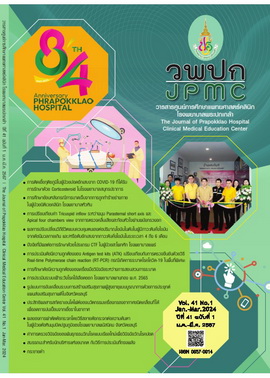Competencies for Future Executives and the Powerful Assessment Methods
Main Article Content
Abstract
Executives serve as the primary driving force of the agency under the context of VUCA World that is constantly dependent on various factors. Objectives of the research are to study, analyze, and synthesize the picture of the world of management in the future, the competencies of executives that are consistent with the future landscape of management, and propose methods or tools for evaluating competencies and performance of executives. The research method used in this study is the mixed-method approach. Data were collected through 13 key informants’ in-depth interviews, and survey questionnaires were administered to 345 respondents.
The results indicate that the future of management will persist within a VUCA world characterized by climate change, geopolitics, population structure, health considerations, technological disruptions, and the concept of clean energy. Executives are expected to possess competencies in leadership, morals and ethics, technology and innovation literacy, change management, business acumen, and strategic prediction. Regarding methods and tools for evaluating competency, most organizations utilize in assessing employee competencies and performance by objective and key results (OKRs), key performance indicators (KPIs) and other competency assessment tools as appropriate.
Article Details

This work is licensed under a Creative Commons Attribution-NonCommercial-NoDerivatives 4.0 International License.
References
Wongthongdee S, Petcharaks N, Navanuch P, Tantrajin P, Kasetkul S, Waiwatthana E, et al. Perspectives towards talent competencies assessments. Bangkok: Dhurakij Pundit University; 2021.
American Management Association. How to build a high-performance organization. New York: American Management Association; 2007.
Office of the Civil Service Commission. Guidelines for government operations that support the new normal [Internet]. 2022 [cited 2023 Dec 27]. Available from: https://www.ocsc.go.th/sites/default/files/document/1.2_aenwthaangkaarptibatiraachkaarthiirngrabchiiwitaelakaarthamngaanwithiiaihm_final.pdf
Wongthongdee S. Human resource development. 4th ed. Bangkok: Chulalongkorn University Press; 2021.
Braun V, Clarke V. Thematic analysis: a practical guide. Los Angeles: SAGE Publications; 2021.
Pricewaterhouse Coopers. Workforce of the future: the competing forces shaping 2030 [Internet]. 2023 [cited 2023 Dec 27]. Available from: https://www.pwc.com/gx/en/services/workforce/publications/workforce-of-the-future.html
Gartner. Redesigning Work for the Hybrid World [Internet]. 2021 [cited 2023 Dec 27]. Available from: https://www.gartner.com/en/documents/4001104
Fuangswasdi K. Future workforce. MPA Special Lectures; 2023 Feb; Bangkok, Thailand. Dhurakij Pundit University; 2023.
Seasia Leadavation Center. SEAC Unveils a New Challenge: Rapid Skills Development as a Crucial Imperative for Individuals and Organizations to Navigate [Internet]. 2022 [cited 2023 Dec 27]. Available from: https://www.seasiacenter.com/th/news-events/news/1
Siriprakob P. OKRs and KPIs: are they fundamentally different in all unimportant respects?. J Prapokklao Hosp Clin Med Educat Center 2023;40(2):264-71.

